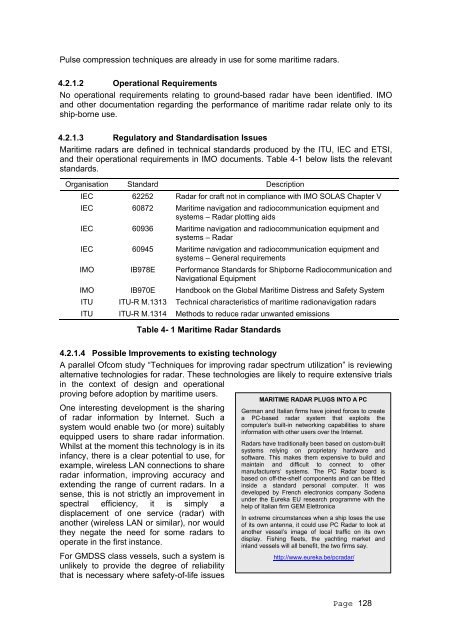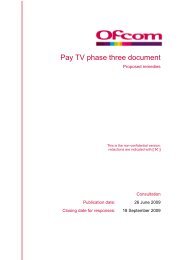FINAL REPORT - Stakeholders - Ofcom
FINAL REPORT - Stakeholders - Ofcom
FINAL REPORT - Stakeholders - Ofcom
Create successful ePaper yourself
Turn your PDF publications into a flip-book with our unique Google optimized e-Paper software.
Pulse compression techniques are already in use for some maritime radars.<br />
4.2.1.2 Operational Requirements<br />
No operational requirements relating to ground-based radar have been identified. IMO<br />
and other documentation regarding the performance of maritime radar relate only to its<br />
ship-borne use.<br />
4.2.1.3 Regulatory and Standardisation Issues<br />
Maritime radars are defined in technical standards produced by the ITU, IEC and ETSI,<br />
and their operational requirements in IMO documents. Table 4-1 below lists the relevant<br />
standards.<br />
Organisation Standard Description<br />
IEC 62252 Radar for craft not in compliance with IMO SOLAS Chapter V<br />
IEC 60872 Maritime navigation and radiocommunication equipment and<br />
systems – Radar plotting aids<br />
IEC 60936 Maritime navigation and radiocommunication equipment and<br />
systems – Radar<br />
IEC 60945 Maritime navigation and radiocommunication equipment and<br />
systems – General requirements<br />
IMO IB978E Performance Standards for Shipborne Radiocommunication and<br />
Navigational Equipment<br />
IMO IB970E Handbook on the Global Maritime Distress and Safety System<br />
ITU ITU-R M.1313 Technical characteristics of maritime radionavigation radars<br />
ITU ITU-R M.1314 Methods to reduce radar unwanted emissions<br />
Table 4- 1 Maritime Radar Standards<br />
4.2.1.4 Possible Improvements to existing technology<br />
A parallel <strong>Ofcom</strong> study “Techniques for improving radar spectrum utilization” is reviewing<br />
alternative technologies for radar. These technologies are likely to require extensive trials<br />
in the context of design and operational<br />
proving before adoption by maritime users.<br />
One interesting development is the sharing<br />
of radar information by Internet. Such a<br />
system would enable two (or more) suitably<br />
equipped users to share radar information.<br />
Whilst at the moment this technology is in its<br />
infancy, there is a clear potential to use, for<br />
example, wireless LAN connections to share<br />
radar information, improving accuracy and<br />
extending the range of current radars. In a<br />
sense, this is not strictly an improvement in<br />
spectral efficiency, it is simply a<br />
displacement of one service (radar) with<br />
another (wireless LAN or similar), nor would<br />
they negate the need for some radars to<br />
operate in the first instance.<br />
For GMDSS class vessels, such a system is<br />
unlikely to provide the degree of reliability<br />
that is necessary where safety-of-life issues<br />
MARITIME RADAR PLUGS INTO A PC<br />
German and Italian firms have joined forces to create<br />
a PC-based radar system that exploits the<br />
computer’s built-in networking capabilities to share<br />
information with other users over the Internet.<br />
Radars have traditionally been based on custom-built<br />
systems relying on proprietary hardware and<br />
software. This makes them expensive to build and<br />
maintain and difficult to connect to other<br />
manufacturers’ systems. The PC Radar board is<br />
based on off-the-shelf components and can be fitted<br />
inside a standard personal computer. It was<br />
developed by French electronics company Sodena<br />
under the Eureka EU research programme with the<br />
help of Italian firm GEM Elettronica<br />
In extreme circumstances when a ship loses the use<br />
of its own antenna, it could use PC Radar to look at<br />
another vessel’s image of local traffic on its own<br />
display. Fishing fleets, the yachting market and<br />
inland vessels will all benefit, the two firms say.<br />
http://www.eureka.be/pcradar/<br />
Page 128
















